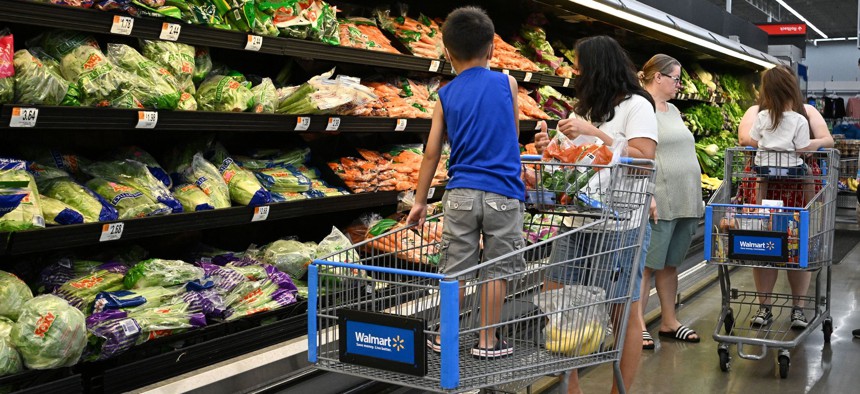Post-pandemic, SNAP benefits aren’t high enough to buy food

In many counties, SNAP benefits are not enough to pay for meals. ROBYN BECK/AFP via Getty Images
A new study finds that people in three-quarters of the nation’s counties don’t receive enough food assistance to pay for their groceries.
Throughout the pandemic, the roughly 42 million people in the U.S. on food stamps got an extra $95 a month. That additional money was enough to pay for meals in almost every county in the country, even as grocery bills skyrocketed last year.
But since the supplement went away in March, people in more than three-fourths of the nation’s counties are no longer getting enough to pay for their food, according to a new study by the Urban Institute, a think tank based in Washington, D.C. And with House Republicans pushing to lower spending on the Supplemental Nutrition Assistance Program, or SNAP, in an effort to reduce overall federal spending, the situation likely won't change.
As it is, the amount people receive in food assistance now that the extra benefit has expired “rarely covers the cost of a modestly priced meal,” wrote the study’s authors. “As a result, many families receiving SNAP benefits remain food insecure.”
One small bit of good news, however, is that the cost-of-living adjustment to SNAP benefits that the U.S. Department of Agriculture makes at the beginning of each fiscal year on Oct. 1 helps some people in the program.
Combined with the pandemic aid, the last increase was enough to allow people to buy “moderately-priced” meals, which essentially keeps them from buying more nutritious, but often more expensive, groceries. But it was enough to allow SNAP recipients to eat in the same way as lower-income people who are not in the program. While the cost of eating “moderately-priced” meals differs from county to county, nationally it means that SNAP recipients were able to spend $3.14 a meal.
In 687 counties, according to the study, the cost-of-living increase was enough to help people afford moderately-priced meals, even without the additional pandemic aid. Before the cost-of-living adjustment was made, only 27 counties received adequate benefits.
In general, though, the increase wasn’t enough to keep pace with how much food prices have gone up, said Elaine Waxman, an Urban Institute senior fellow and one of the study’s authors. It also wasn’t enough to make up for the loss of pandemic aid for most counties. Without the extra $95 a month, people in about 2,450 counties aren't getting enough to be able to eat as well as other lower-income people.
The study also noted that the issue affects both urban and rural counties.
Even with the cost-of-living adjustment, urban counties have a larger gap between the cost of the meals and how much people receive. Still, four of the five counties with the largest gaps are rural—Leelanau County, Michigan; Teton County, Idaho; and Lincoln and Teton counties in Wyoming.
Meanwhile, the five urban counties with the largest gaps are New York County, New York; Marin County and San Francisco County, California; Butte County, Idaho; and Arlington County, Virginia.
The loss of the benefit doesn’t only mean that people are hungry, Waxman said. It also creates “a public health problem,” she warned, noting that poor nutrition can lead to higher rates of diabetes and other chronic diseases.
While Republicans might want to cut spending on the program, she argued that it could lead to higher costs for other programs like Medicaid.
That finding and others from the study come as Congress is set to take up the farm bill, which funds the program, after the August recess. The GOP House is widely expected to request cuts.
In a possible preview of what Republicans will seek in cuts, the House Appropriations Committee in May passed a bill that called for reducing spending on SNAP by $32 billion. The cuts, according to a Republican fact sheet, reflect the end of pandemic aid and a drop in the number of people on food stamps, but it is not clear how the cuts would affect the amount people receive every month.
Republicans have expressed alarm that federal spending for the program has nearly doubled in recent years, much of it due to changes that the Biden administration made in 2021.
In addition to the pandemic assistance, Congress in its last update of the farm bill in 2018 authorized the Agriculture Department to reexamine how it determines how much food assistance people should receive for the first time since 1975. The department in 2021 began considering factors like current food prices, consumption patterns, modern dietary guidance, and the ability to buy more fish and vegetables. According to a U.S. Government Accountability Office report last December, the guidance raised the amount of food benefits people receive by 21%.
Groups like the National Association of Counties and the Mayors Alliance to End Childhood Hunger, a nonpartisan coalition of more than 130 mayors from 45 states and Washington, D.C., have been calling for Congress to increase SNAP benefits.
While inflation has slowed, Waxman noted, food prices are still going up.
Kery Murakami is a senior reporter for Route Fifty, covering Congress and federal policy. He can be reached at kmurakami@govexec.com. Follow @Kery_Murakami






